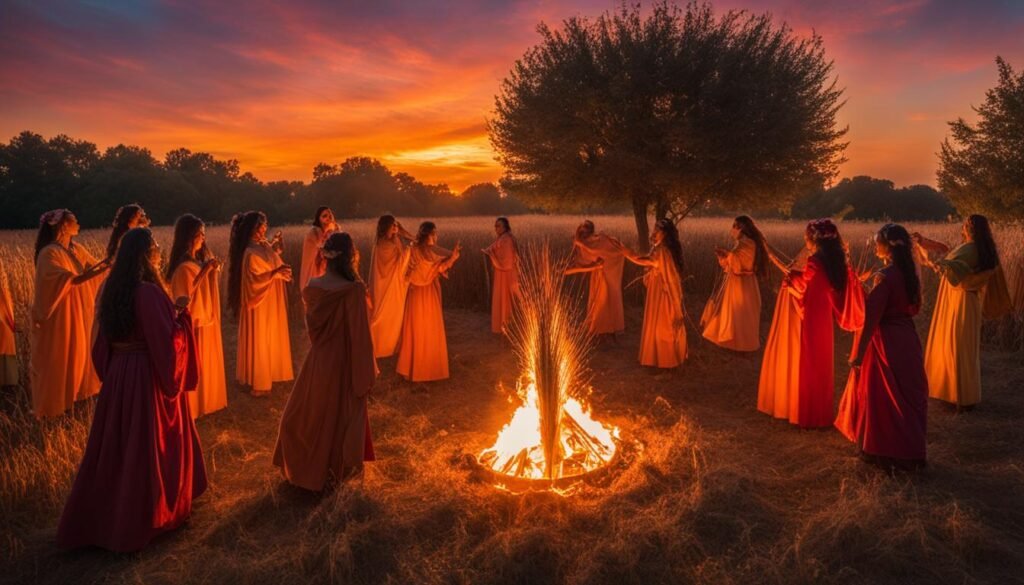In Greek mythology, Echo was a nymph who played an important role in the story of Echo and Narcissus.
She was a wood nymph who often interacted with the gods, including Zeus and Hera. However, after tricking Hera to protect Zeus and his affairs, Echo was cursed to only be able to repeat the words of others.
This curse had a significant impact on her interactions with Narcissus, ultimately leading to tragedy.
Key Takeaways:
- Echo was a nymph in Greek mythology
- She was cursed to only be able to repeat the words of others
- Her curse had a significant impact on her interactions with Narcissus
- The story of Echo and Narcissus explores themes of unrequited love and the consequences of vanity
- Echo’s tale serves as a cautionary tale about the importance of genuine connections
The Story of Echo and Narcissus
The tale of Echo and Narcissus is a poignant story of unrequited love and tragic consequences.
It centers around the nymph Echo and the handsome youth Narcissus, whose fateful encounter marked their destinies forever.
Echo, a beautiful wood nymph known for her enchanting voice, instantly fell deeply in love with Narcissus.
However, she was cursed by the goddess Hera to only be able to repeat the words of others, forever denied the ability to express her own feelings.
Despite her affliction, Echo could not help but express her affection for Narcissus, hoping he would return her love.
Yet, Narcissus, consumed by his own vanity and self-love, spurned Echo’s advances, dismissing her with callous disregard.
The rejection shattered Echo’s heart, leaving her transformed into a mere lonely voice, condemned to forever be heard but never truly seen or acknowledged.
Her lingering presence in the mountains and valleys became a haunting reminder of unrequited love and the devastating consequences of vanity.
The story of Echo and Narcissus serves as a timeless legend that warns of the perils of egoism and the importance of empathy and genuine connections in relationships.
It is a reminder that true love, when unreciprocated, can lead to profound sorrow and lasting echoes of longing.
Echo and Narcissus in Greek Mythology

In Greek mythology, Echo is a significant character symbolizing unrequited love and the loss of voice.
She embodies the pain and longing that can arise from unreturned affections, serving as a poignant reminder of the depths of unrequited love.
This myth also explores the destructive nature of narcissism, evident in the character of Narcissus.
His excessive self-obsession ultimately leads to his own downfall.
Echo’s story stands as a cautionary tale, highlighting the consequences of excessive self-love and emphasizing the importance of empathy and genuine connections in relationships.
It serves as a timeless reminder of the perils of vanity and serves as a moral guide in navigating the complexities of love and self-identity.
The Significance of the Thesmorphia Festival

The Thesmorphia festival holds immense significance in ancient Greek culture, serving as an important celebration that marked the end of the harvesting season.
This ancient Greek festival, primarily observed by women, provided a meaningful opportunity for giving thanks and honoring the gods, particularly Demeter and Persephone.
Carried out in late October or early November, the Thesmorphia festival brought together women from various communities to engage in communal activities, fostering bonds and reinforcing social ties.
Women played a prominent role in this festival, participating in the preparation of feasts and the performance of sacred rituals for the prosperity of the harvest.
This harvest festival was not just an occasion for merriment; it held a deeper significance in the ancient Greek society.
It symbolized the gratitude of the farming community for the bountiful harvest they had reaped, and provided an opportunity to express their reverence for Demeter, the goddess of fertility and agriculture, along with her daughter Persephone, who played a pivotal role in the cycle of seasons.
Through the Thesmorphia festival, the ancient Greeks acknowledged the interconnectedness of humanity with the natural world, recognizing the divine forces that governed the agricultural cycle.
This celebration emphasized the importance of giving thanks, cultivating a sense of harmony and gratitude within the community as they honored the deities who blessed them with the abundance of the harvest.
The Thesmorphia festival stands as a testament to the deep-rooted cultural practices of the ancient Greeks and exemplifies their reverence for nature and the divine.
It serves as a reminder of the vital role agriculture played in their lives and the importance of maintaining a harmonious relationship with the natural world.
By participating in this annual celebration, the ancient Greeks not only expressed gratitude for the harvest but also strengthened their sense of community and their connection to the gods.
Conclusion
Echo’s tale in Greek mythology has cemented itself as an enduring legend, captivating audiences with its exploration of unrequited love and the loss of voice.
The story of Echo and Narcissus serves as a cautionary tale, shedding light on the destructive nature of narcissism and emphasizing the importance of genuine connections in our lives.
Within the context of Greek mythology, Echo’s character symbolizes the profound pain and longing that can arise from unreturned affections.
Her tragic transformation into a mere voice underscores the significant consequences of vanity and self-obsession, as seen in Narcissus.
This timeless myth continues to resonate with audiences, serving as a reminder of the complex emotions and enduring lessons found in Greek mythology.
Additionally, Echo’s tale highlights the significance of gratitude and harvest festivals in ancient Greek culture.
The Thesmorphia festival, which marked the end of the harvesting season, played an essential role in expressing gratitude for the bountiful yields and honoring the gods, particularly Demeter and Persephone.
It served as a vital occasion for communal bonding and the reinforcement of social ties.
Today, Echo’s story holds a special place in the hearts and minds of those who are drawn to Greek mythology. It continues to inspire and captivate audiences, reminding us of the timeless themes of unrequited love, loss of voice, and the enduring power of genuine connections.
Through Echo’s tale, Greek mythology offers a unique lens through which we can explore the intricacies of human emotions and the lessons that have transcended centuries.
Frequently Asked Questions
Q: What was Echo known for?
A: Echo was known for her beautiful voice and her punishment which left her only able to repeat the words of others, hence the origin of the term “echo.”
Q: What is the story behind Echo?
A: Echo was a nymph who loved her own voice. She was punished by Hera, who made her unable to speak except to repeat the words of others, after she discovered Echo was distracting her with long stories while Zeus engaged with other nymphs.
Q: Why was Echo cursed?
A: Echo was cursed by Hera because she used her loquaciousness to distract Hera while Zeus was consorting with other nymphs. Hera limited her speech so that she could only repeat the last words spoken to her.
Q: Who was Echo to Hera?
A: Echo was one of the mountain nymphs and did not have a personal relationship with Hera before the curse. She was merely a tool in Zeus’s deceptions towards Hera.
Q: Why is Hera so angry with Echo?
A: Hera was angry with Echo because she felt betrayed and deceived by Echo’s role in distracting her, allowing Zeus to continue his affairs unnoticed.
Q: Why did Echo fall in love with Narcissus?
A: Echo fell in love with Narcissus upon seeing him, struck by his beauty and youthful charm. Unfortunately, her affection was unrequited as Narcissus was unable to love anyone but himself.
Q: What happened to Echo after Narcissus died?
A: After Narcissus died, Echo was left heartbroken and desolate. She gradually faded away until only her voice remained, echoing in the mountains.
Q: Why did Echo hide herself in a dark cave?
A: Echo hid in a dark cave out of despair and shame for her unrequited love for Narcissus, and because of her inability to express herself fully due to Hera’s curse.




